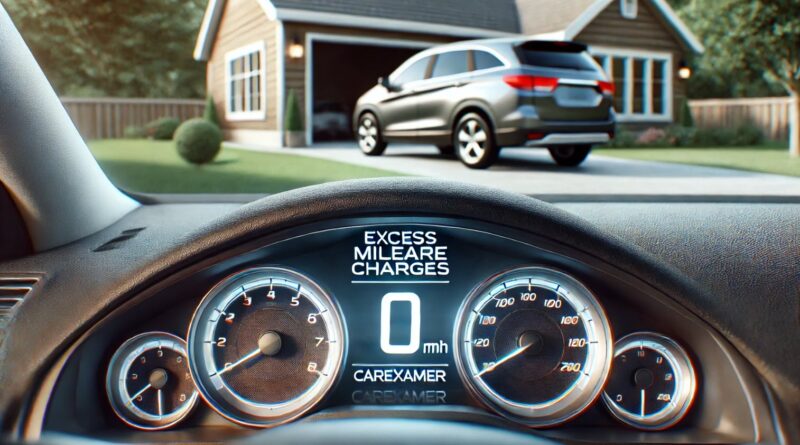Excess Mileage Charges on a Lease Car: How to Avoid Them
Let’s break down what excess mileage charges on lease car are, why they exist, and how you can avoid them. Leasing a car can be a great way to drive a new vehicle without the long-term commitment of buying one. However, one thing that often catches people off guard is excess mileage charges. These are extra fees you pay if you drive more than your agreed mileage limit. But don’t worry—there are ways to avoid them.
What Are Excess Mileage Charges?
When you lease a car, the leasing company sets a mileage limit, usually between 8,000 and 20,000 miles per year. If you go over this limit, you’ll have to pay an excess mileage charge. This charge is usually a per-mile fee, which can range from 5p to 30p per mile depending on the car and the lease agreement.
For example, if you have a 12,000-mile annual limit and drive 15,000 miles, you’ll owe for the 3,000 extra miles. If your excess mileage fee is 10p per mile, you’d pay £300 at the end of your lease.
Why Do Leasing Companies Charge for Extra Miles?
Leasing companies charge for excess mileage because more miles mean more wear and tear on the car. The more miles a car has, the lower its resale value. So, when you drive more than agreed, the leasing company compensates for this by charging you.
How to Avoid Excess Mileage Charges
While excess mileage charges can add up, there are plenty of ways to avoid them:
1. Estimate Your Mileage Accurately
When you’re setting up your lease, think carefully about how many miles you drive in a year. Include your daily commute, weekend trips, and holiday travel. It’s better to slightly overestimate than to risk underestimating and facing extra charges.
2. Choose a Higher Mileage Limit
If you’re unsure or know you’ll be driving a lot, it’s smart to choose a higher mileage allowance from the start. While this might increase your monthly payments slightly, it’s still cheaper than paying excess mileage fees at the end of your lease.
3. Keep Track of Your Mileage
Make it a habit to check your mileage regularly. This will help you see if you’re getting close to your limit so you can adjust your driving if needed. There are even mobile apps you can use to track your mileage and set reminders.
4. Reduce Your Driving If Needed
If you notice that you’re getting close to your mileage limit, consider cutting back on your driving. You could carpool, take public transport, or plan your trips more efficiently to avoid unnecessary miles.
5. Negotiate Extra Miles During Your Lease
If you realize partway through your lease that you’re going to go over your mileage limit, talk to your leasing company. Many companies allow you to buy extra miles mid-lease, which can be cheaper than paying for excess mileage at the end.
6. Consider Early Lease Termination
If you consistently exceed your mileage limit, you might want to explore early termination of your lease. This can come with its own fees, so weigh up the costs against what you’d pay for excess miles before making a decision.
What to Do If You’ve Already Exceeded Your Mileage Limit
If you’re nearing the end of your lease and have already gone over your mileage limit, here’s what to do:
- Check your lease contract: Make sure you know exactly how much you’ll be charged per mile.
- Talk to your leasing company: Sometimes, leasing companies offer flexibility, especially if you plan to lease another car from them.
- Explore your options: If excess mileage fees are high, you could consider buying the car at the end of the lease to avoid the charges.
How Much Do Excess Mileage Charges Cost?
Excess mileage charges vary depending on the type of car you’re leasing and the leasing company. Here’s a rough idea of what you might expect:
- Small cars: 8p to 10p per mile
- Mid-size cars: 12p to 15p per mile
- Luxury cars: 20p to 30p per mile
It’s important to check your contract for the exact rate, as these charges can add up quickly if you’re significantly over your limit.
Can You Dispute Excess Mileage Charges?
If you feel the excess mileage charges are unfair or wrong, you can try to dispute them. Keep track of your mileage and any communication with the leasing company. However, it’s usually easier to avoid the charges in the first place by estimating your mileage correctly and staying on top of it during the lease.
Conclusion
Excess mileage charges can be an unexpected cost at the end of a lease, but they’re easy to avoid with some planning. Accurately estimate your mileage, choose the right mileage limit, and track your usage to stay within your allowance. If you do find yourself close to your limit, consider negotiating with the leasing company or adjusting your driving habits to avoid extra fees. By taking these steps, you can keep your lease experience hassle-free and avoid those dreaded excess mileage charges.
Buying a used VW. Buying used vauxhall, BMW, Jaguar, Ford, Volvo, Range rover, Bentley, Aston Martin, Porsche, Ferrari, Lamborghini, Maserati, Hyundai, Tesla, Honda, Pagani

